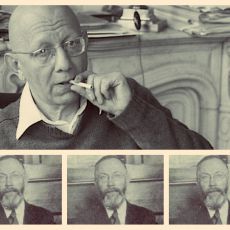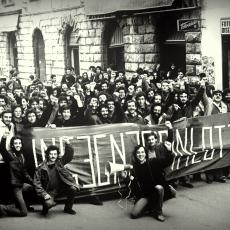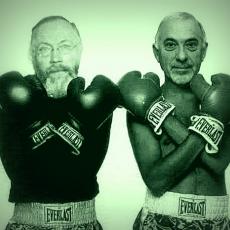Putting “Isms” in Their Place: A Review Essay - Mike Miller - socialpolicy
"The Roman arena was technically a level playing field. But on one side were the lions with all the weapons, and on the other the Christians with all the blood. That's not a level playing field. That's a slaughter. And so is putting people into the economy without equipping them with capital, while equipping a tiny handful of people with hundreds and thousands of times more than they can use." (Louis Kelso in A World of Ideas, by Bill Moyers; Doubleday, 1990)
Can anyone any longer doubt that money and corporate power define the agenda of American politics? Can anyone seriously argue that if we fail to tame the economy, and bring it under democratic control, the 1% (more accurately the .1% or even .01%) will determine the fate of the planet and its people?
The agenda of our time should be to create voluntary associations as forums within which everyday people can discuss, debate, deliberate, argue, compromise, reflect, evaluate, learn, and powerfully act on their values and interests framed by a search for the common good, the public interest, and a blurred vision of the good society. Shared core values—those of the historic democratic tradition and of the justice teachings of the world’s great religious faiths—should frame a discussion that recognizes that all solutions are partial, that each presents new problems, that none are total, and that, in the words of the 1960s civil rights movement song, “freedom is a constant struggle.”
Worker Ownership and Control
This commitment to democracy is found in both Ness/Azzellini and Mathews, whose respective books are essential reading for anyone interested in how democracy might apply at the workplace. The former is an impressive collection of articles examining workers’ control as an expression of socialism and anarcho-syndicalism. Essays are both historical (spanning the twentieth century, and reaching into the first decade of the twenty-first) and international (the U.S., Soviet Union, Britain, Western and Eastern Europe, Asia, Africa, and Latin America). Ness/Azzellini place worker ownership and control under the rubric of socialism.
Writers in the Ness/Azzellini collection are painfully aware of important nuances in the development of worker ownership: ownership without control; ownership in which old patterns of deference to authority—based on class, party, education and status—are maintained; ownership controlled by the state; ownership constrained by the vagaries of a market beyond the control of individual enterprises or even collections of them. They deal with the necessity of coordination beyond the enterprise level, the relationship of the state to the economy, the tendency toward parochialism and narrow self-interest that can arise in worker-owned businesses, and more. This is an important book.
A consistent Ness/Azzellini theme is criticism of vanguard parties and state control. In his “Worker’s Control and Revolution,” (Ness/Azzellini), Victor Wallis criticizes Lenin’s “disfavor to worker-control initiatives…In defense of [Lenin’s] stance, one can point out that many workers escaping the old [factory] discipline abused their freedom of action; however workers’ widespread heroism in the civil war suggests that if given meaningful opportunity [experienced managers would become “consultants”] the workers might well have acted differently.” The examples in the rest of the book testify to the realism of that possibility.
Mathews, on the other hand, wants to establish cooperativism as a “third way” between socialism and capitalism, and is particularly interested in its Catholic theological origins in the Encyclical Rerum Novarum and a subsequent expression—the Distributists. Their history is murky, including 1930s flirtations with Italian and Spanish fascism and with anti-Semitism. The intellectual origins of this theory are in “the prominent Catholic writers Hilaire Belloc and Gilbert Chesterton, together with—a little later—Gilbert’s younger brother Cecil Chesterton...all three were former socialists whose schooling in and around the socialist movement of the day enabled them to think their way through to a clear understanding of what sort of social reform made sense to them…[K]ey aspects of distributist thought were incorporated into new socialist philosophies such as guild socialism. The differences and tensions between the two camps, demonstrated in the ongoing debate on public platforms and in the weekly journals of the day, enriched both of them.” (Emphasis added.) This is an important book as well.
Mathews correctly identifies the beginnings of distributism in “an emergent synthesis between two more immediate reactions to poverty, namely those of British socialism as exemplified by the socialist revival of the 1880s, and the Catholic social teachings [of] Pope Leo XIII—acting in part at the instigation of the great British cardinal, Henry Manning,” and subsequently elaborated by the “personalist teachings of the prominent French Catholic philosophers, Jacques Maritain and Emmanuel Mounier.” His examples on the ground are the British Rochdale Cooperative Movement, the Nova Scotia Antigonish Movement, and “finally, by the ‘evolved distributism’ of the great complex of industrial, service and support co-operatives—now the Mondragon Co-operative Corporation (MCC)—which a remarkable Catholic priest, Don Jose Maria Arizmendiarrieta established in the 1940s and 1950s.”
Where Shall The Twain Meet?
It is astonishing to me that nowhere in Ness/Azzellini is there mention of the Antigonish Movement, Mondragon, Rochdale Cooperativism, guild socialism or GDH Cole, the latter’s principal theorist. Equally stunning is Mathews’s lack of reference to the rich experience and theoretical discussion present in Ness/Azzellini’s intelligent case studies.
Why? I believe the answer to this question is that down-deep these authors want worker ownership to serve a more overarching theory of how justice is to be achieved—socialism in the case of Ness/Azzellini and their collection of writers, distributism (cleaned of anti-semitism and fascism) in the case of Mathews, and capitalism in discussions of Employee Stock Ownership Plans (ESOPs)—where earnings are demonstrably greater in firms that combine employee ownership with employee participation in management. These tendencies exist despite the fact that the protagonists are all small “d” democrats. None is enamored of either a closed vanguard party, or of a theological or corporate elite who must guide the people to freedom or control them.
Are these different routes to worker ownership and control to remain in separate silos of conversation, or is there a way to bring the discussions together to strengthen each other? Can radicals, liberals, progressives, socialists, personalists, populists, social gospelists, small “c” capitalists or anyone else who cares about social and economic justice and popular participation (i.e. democracy) overcome the power of the present corporate and financial power elite without an affirmative answer, without constructing forums that bridge the silos? This is possible to achieve, as proven by numerous small “d” democratic organizers who have worked on the ground with faith in the capacities of everyday people and over the last hundred years have created the popular forums in which democratic power might be built, expanded, and enhanced.
Two Communist organizer/leaders of the Depression era, William Sentner in District 8 (St. Louis, Missouri area) of the United Electrical, Radio & Machine Workers (UE) and Herb March in the United Packinghouse Workers of America (UPWA), fought their own party when its dictates contradicted their democratic vision and commitment to their unions. They worked with Catholics, socialists, liberals, and other democrats to make their unions into democratic forums. On local matters each of them was generally able to beat down efforts from “on high” to tell them how to conduct union business. They contested “party discipline” and often beat it. Their experiences are detailed in Reuther, Zack and Balanoff/March.
The UE was expelled from the CIO as a “Communist-dominated” union. It survived the purge, along with the West Coast longshoremen’s union, ironically to be further weakened by the Communist Party. As James Lerner describes it, “The great reduction in UE’s membership, caused first by the McCarthy hearings and later by Communist Party efforts to break up the union in favor of the AFL-CIO merger, had devastating effects on the union’s bargaining strength.” The lesson of “ism” trumping small “d” democracy is well illustrated in his tale of UE; Reuther fills in details.
Herb March worked closely with Saul Alinsky in the development of the Back of the Yards Neighborhood Council (BYNC)—where the alliance of the union with local Catholic parishes, the Archdiocese, and small capitalists (i.e. neighborhood merchants and businessmen who extended credit during the duration of the packinghouse strike, and otherwise supported the strikers) was central to victory. Like Sentner, he fought against the Community Party for union democracy; he finally left the Party, he told me, over that struggle.
I am persuaded that Alinsky’s organizations, that sought to bring “everyone” in a broad constituency together under a common organizational umbrella so that they could unite behind a people’s program in a blurred vision of the good society and in opposition to any kind of centralized elite control, remain organizational forms from which important lessons for today can be drawn. Recall Victor Wallis’ phrase, “if given meaningful opportunity…” It echoes Alinsky’s idea of democracy, “given the opportunity, most of the time the people will make the right decision.” In a criticism of more current organizing, the extraordinary Chicago Catholic priest Msgr. Jack Egan asked me shortly before his death, “Mike, aren’t we supposed to get everybody in these organizations?”
Toward A Reframing
In a 2003 interview in the Communist journal, Political Affairs, noted playwright Tony Kushner was asked “about the crisis in theory…Do you think that the left feels it can’t proceed for lack of a grand explanation for moving forward…?” “Yes,” He replied, “Yes...I don’t know that a meta-theory can really ever have credibility again. I don’t know that it ever should…Any theory that seeks to explain all of history, and offers a single prescription for the incredible variety and the complexity of human behavior, has to rest on an oversimplification of people. Human beings are both communal beings and individuals, and to lose sight of one or the other is problematic…It’s the notion of economic justice, something like social justice, something like a recognition finally of the communal as well as the individual…powerful ideas that have persisted for centuries [with] great value in them” that are the overarching basis for moving forward. Those are ideas to be found in the Old Testament, Koran, Christian Gospels, and the secular Enlightenment tradition.
“All the problems of democracy,” Kushner says, “can only be solved by more democracy. If there is hope, it lies in a radical vision of democracy as a universal enfranchisement.”
For me, Alinsky’s “I don’t like to see people pushed around” combined with democratic values and practice, and careful analysis of current power relationships is sufficient. If others need grand theory, that’s o.k. But whatever the grand theory is, it needs to acknowledge that it doesn’t have a monopoly on the truth—and that democratic forums are needed to arrive at proximate truths, revise them based on experience, and continue on in the constant struggle for freedom and justice.
Mike Miller directs the San Francisco-based ORGANIZE Training Center. Reach him at www.organizetrainingcenter.org
Material discussed includes:
Ness/Azzellini: Immanuel Ness and Dario Azzellini, Ours to Master and to Own: Workers Control from the Commune to the Present (Haymarket Books, 2011); Mathews: Race Mathews, Jobs of Our Own: Building a Stakeholder Society—Alternatives To The Market and the State (Distributist Review Press, 2nd edition, 2009); Feurer: Rosemary Feurer, Radical Unionism in the Midwest, 1900-1950; (University of Illinois Press,2006); Lerner: James Lerner, edited by Richard Neil Lerner and Anna Marie Taylor, Course of Action: A Journalist’s Account from Inside (RNL Publishing, 2012); Targ: Harry Targ, “Herb March and Vicky Starr: Chicago Organizers of the United Packinghouse Workers of America (UPWA-CIO) (paper presented at the Working Class Studies Association, 2011 Conference, Chicago, Illinois); Balanoff/March: Elizabeth Balanoff and Richard March, Interview with Herbert March;” Roosevelt University Oral History Project in Labor History (November, 1970); Kushner: Tony Kushner, “Dramatic Revisions and Socialist Visions: interview with playwright Tony Kushner,” Political Affairs (January, 2003); Kelso/Hetter: Louis Kelso and Patricia Hetter, Two-Factor Theory: The Economics of Reality (Random House, 1967); Miller: Mike Miller, Mondragon: A Report From The Cooperatives in The Basque Region of Spain (Organize Training Center, 1994); and Schutz/Miller: Aaron Schutz and Mike Miller, People Power: Classic Texts in the Alinsky Community Organizing Tradition (Vanderbilt University Press, title tentative, 2013).




